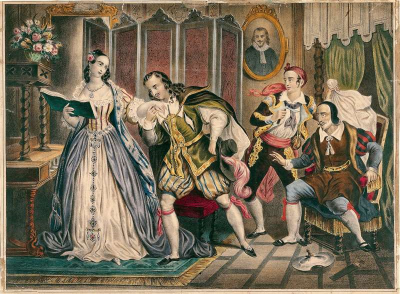The Barber of Seville

by Gioacchino Rossini
“Make way for the ablest man in Seville, bar none! Jack of all trades and master of every one!”
Surely the pinnacle of opera buffa, this masterpiece is rich with great tunes, artful comedy and human foibles. Savor its memorable characters and absurd situations in this sparkling new English performing translation.
Excerpt:
Act I, Rosina: “Una voce poco fa“
"His sweet voice so touched my heart.
Now it's so full that it may break.
It hurts me so that we're apart.
How will I ever bear this ache?
He's the answer to my prayer.
I'll make him mine,
by Heaven, I swear!
The old Doctor will object.
He keeps me under lock and key.
I'll need a ploy he won’t suspect
if I'm ever to get free.
I'm always well-behaved, most respectful and polite,
humble and obedient, gentle and contrite.
I'm never willful. I'm never willful,
and let my guardian be my guide.
But, now there's something that I want,
and if he dares to block my path,
then he had best be ready to feel my wrath!
I've got some tricks to play.
I aim to get my way.
Know that I will not be denied!"
Translation copyright 2018 Kenneth Jakobs
All rights reserved.
Notes
If there is a more charming or entertaining character in all of opera, I cannot think who. Figaro, the eponymous barber of Seville, is a dazzling showman and cunning strategist, with a heart of gold (as long as his pockets are being filled with it). His brilliant schemes facilitate the union of the young, smitten Count Almaviva and the lovely Rosina, ward of the unsavory Dr. Bartolo who wants to marry her for her dowry. While the Count makes a sweet, besotted lover, it’s clearly Figaro who is the mastermind. And, of course, love wins the day.
Based on the Beaumarchais play, Le Barbier de Séville, the first of three chronicling the lives of these same characters (notably including the incendiary Le Mariage de Figaro which was banned for years), Barber dramatizes one of the author’s favorite themes: that a common man may be the intellectual equal of his “betters”. As Figaro says in his famous aria, “Though I’m unschooled and humble by birth, what do I care if I’m considered an upstart by men of ‘quality’? I’ll not let them determine my worth!”
The clever plot is set to a marvelous score containing some of opera’s most complex, ingenious and tuneful ensembles as well as memorable arias like Figaro’s well-known “Largo al factotum della città“, Rosina’s aria (above), comic masterpieces for both Don Bartolo and his crony, Don Basilio, and truly exquisite tenor arias for the Count. Performed well (and in an excellent English translation), this work is as good as comic opera gets.
